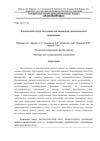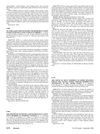 36 citations,
February 2011 in “Fertility and Sterility”
36 citations,
February 2011 in “Fertility and Sterility” Finasteride use may cause sperm damage and infertility, stopping it can improve sperm health.

Using too much topical minoxidil can cause serious side effects like dizziness and low blood pressure.
 September 2024 in “Journal of the American Academy of Dermatology”
September 2024 in “Journal of the American Academy of Dermatology” Experts agree on guidelines for safely using low-dose oral minoxidil to treat hair loss.
 6 citations,
September 2022 in “Journal of Clinical Medicine”
6 citations,
September 2022 in “Journal of Clinical Medicine” The treatment might help COVID-19 related hair loss, but more research is needed.
 46 citations,
September 2010 in “Southern Medical Journal”
46 citations,
September 2010 in “Southern Medical Journal” Hair loss treatments include medications and new methods like low-level light therapy, which may work by boosting cell activity and blood flow.
10 citations,
October 2006 in “Expert Opinion on Emerging Drugs” New treatments for male hypogonadism are easier to use and target specific tissues to reduce side effects.
 8 citations,
March 2012 in “The Journal of Steroid Biochemistry and Molecular Biology”
8 citations,
March 2012 in “The Journal of Steroid Biochemistry and Molecular Biology” Testosterone and dihydrotestosterone have similar effects on body composition and metabolic health in men.
 August 2024 in “IAHS Medical Journal”
August 2024 in “IAHS Medical Journal” Low vitamin D and ferritin levels are linked to female hair loss.
280 citations,
May 2005 in “Andrology” Testosterone treatment for older men can have short-term benefits, but long-term risks are unclear, requiring careful evaluation and monitoring.
 6 citations,
November 2010 in “International Journal of Andrology”
6 citations,
November 2010 in “International Journal of Andrology” New oral testosterone formulations show potential for safer, effective hormone replacement in men with low testosterone.
 48 citations,
July 2009 in “The Journal of Sexual Medicine”
48 citations,
July 2009 in “The Journal of Sexual Medicine” DHEA did not improve sexual function, well-being, or menopausal symptoms in postmenopausal women with low libido but caused side effects like acne and increased facial hair.
 16 citations,
February 2018 in “European Journal of Endocrinology”
16 citations,
February 2018 in “European Journal of Endocrinology” Diagnosing hyperandrogenism in women is complex and requires accurate testing methods and consideration of SHBG levels.
 13 citations,
September 1986 in “Archives of Dermatology”
13 citations,
September 1986 in “Archives of Dermatology” Women with more 3α,17β-androstanediol glucuronide compared to sex hormone binding globulin are more likely to have female pattern baldness.
 January 2016 in “Archivio italiano di urologia, andrologia”
January 2016 in “Archivio italiano di urologia, andrologia” The document concludes that the risk of sexual side effects from 5-alpha-reductase inhibitors is low and often temporary, but more research is needed on potential permanent effects.
 21 citations,
November 2017 in “Archives of Dermatological Research”
21 citations,
November 2017 in “Archives of Dermatological Research” Higher enzyme levels found in women with hair loss, suggesting hormone imbalance.
 June 2020 in “Medicina estética (Madrid)”
June 2020 in “Medicina estética (Madrid)” Female pattern hair loss is common and should be treated early to prevent worsening, with Minoxidil being the main approved treatment.
March 2023 in “Pakistan Journal of Medical and Health Sciences” Low vitamin D levels are linked to higher rates of hair loss in women.
 75 citations,
February 2016 in “The Journal of Sexual Medicine”
75 citations,
February 2016 in “The Journal of Sexual Medicine” Androgens play a role in female sexual function, and testosterone therapy can help women with low sexual desire, but more research is needed on treatments and long-term safety.
 58 citations,
September 1991 in “British Journal of Dermatology”
58 citations,
September 1991 in “British Journal of Dermatology” Women with AGA often face anxiety, depression, and low self-esteem; psychological support is important.
January 2021 in “Brazilian Journal of Development” Female hair loss causes emotional distress and needs holistic treatment.
26 citations,
December 2019 in “Indian Journal of Dermatology, Venereology and Leprology” PRP combined with minoxidil is the most effective and safe treatment for male pattern baldness.
 May 2016 in “The Journal of Sexual Medicine”
May 2016 in “The Journal of Sexual Medicine” PFS affects some women, steroids easily bought online, hypogonadism info unreliable, low testosterone linked to CVD.
 April 2017 in “Reactions Weekly”
April 2017 in “Reactions Weekly” Finasteride may cause weak ejaculation and reduced semen volume.
 May 2020 in “Current developments in nutrition”
May 2020 in “Current developments in nutrition” Low dose finasteride doesn't change lipid profile or metabolic parameters in mice.
 July 2023 in “Health science reports”
July 2023 in “Health science reports” Alopecia Areata is linked to a higher risk of several diseases, which vary with age and sex.
 February 2024 in “Agroèkoinfo”
February 2024 in “Agroèkoinfo” Environmental factors and grain products affect hair loss, with low cobalt in hair possibly predicting the condition.
 March 2020 in “Journal of Cosmetic Dermatology”
March 2020 in “Journal of Cosmetic Dermatology” Hair loss affects self-esteem; patients seek effective, low side-effect treatments.
 8 citations,
February 2022 in “Vascular Health and Risk Management”
8 citations,
February 2022 in “Vascular Health and Risk Management” Some skin conditions may increase the risk of heart disease, and understanding their connection could lead to better treatments.
 2 citations,
January 2021 in “Cureus”
2 citations,
January 2021 in “Cureus” Long-term anabolic steroid use can lead to heart and metabolic health issues.
 2 citations,
September 2008 in “Fertility and Sterility”
2 citations,
September 2008 in “Fertility and Sterility” Women with PCOS and higher BMI, especially those with morbid obesity, are at greater risk for depression.

























